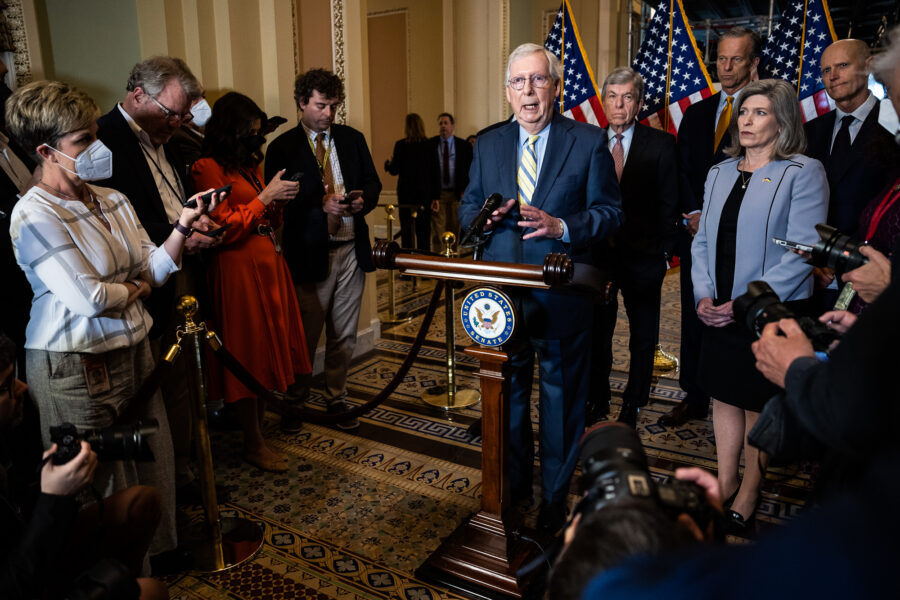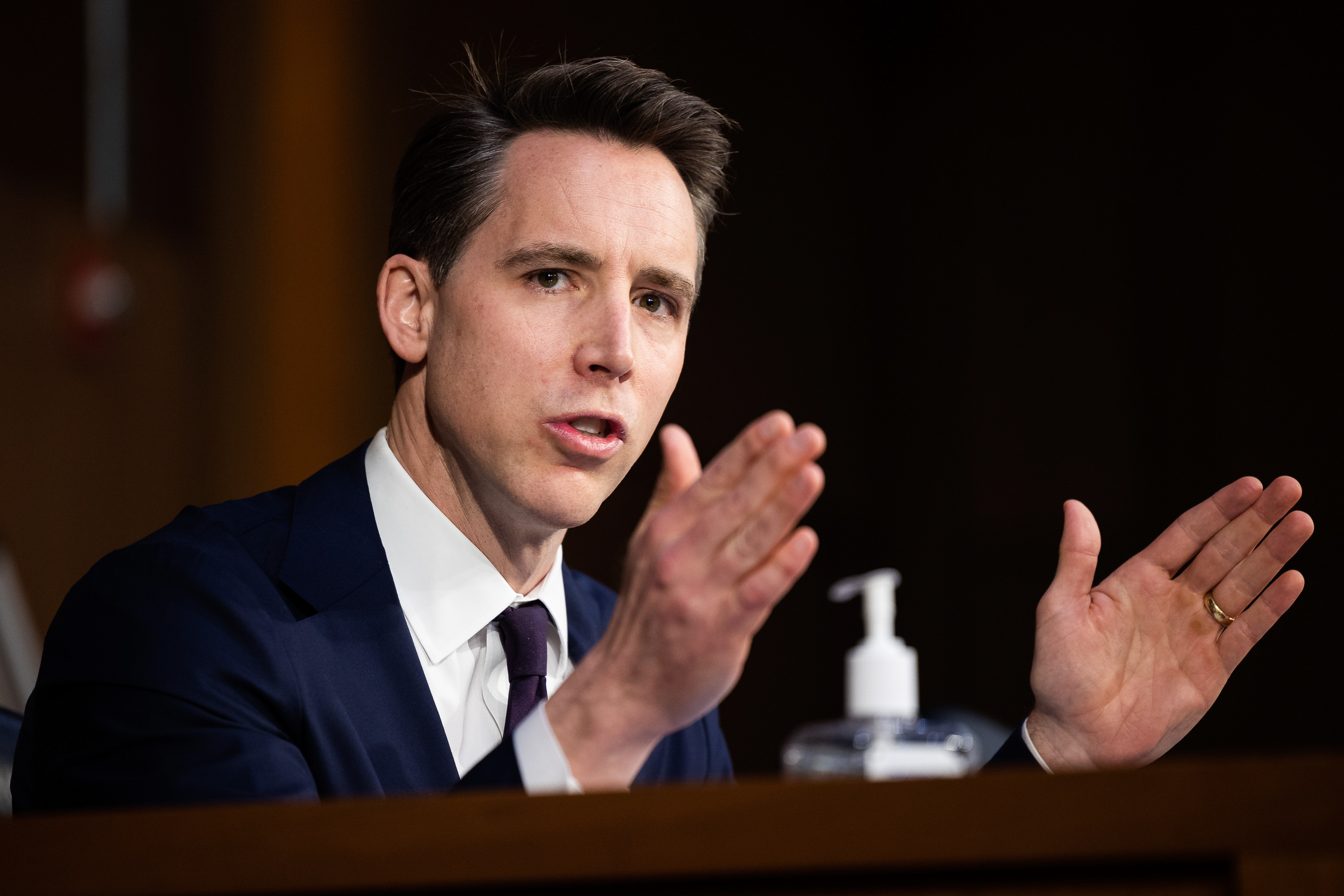McConnell closes in on Roe after years of pushing the courts rightward

The Supreme Court’s draft majority opinion striking down Roe v. Wade couldn’t have happened without Mitch McConnell.
There’s a direct line from the Senate minority leader’s decision to hold a high court vacancy open in 2016 to the potential demise of Roe six years later. McConnell’s blockade of Merrick Garland, the Obama Supreme Court nominee who’s now attorney general, set the stage for a 6-3 conservative majority where Chief Justice John Roberts is no longer the swing vote on contentious issues such as abortion access.
But that’s not to say McConnell is taking credit for the Supreme Court’s place on the precipice of overturning five-decade-old precedent.
At Tuesday’s private Republican Party lunch, he told his members to concentrate on the breach of the draft opinion in their responses, particularly if they felt uncomfortable with addressing the substance of Justice Samuel Alito’s document, according to four attendees. And in public remarks afterward, McConnell distanced his longstanding push to reshape the federal judiciary from the future of Roe.
Yet his allies said that there’s no way Roe v. Wade would be in imminent danger without a series of decisions McConnell made over roughly a decade reflecting his single-minded focus on installing a conservative judicial majority. Stopping Garland and installing Justice Neil Gorsuch kept the court from tilting to the liberals. And installing Justices Brett Kavanaugh and Amy Coney Barrett cemented a court almost sure to be hostile to abortion rights.
“Republicans confirmed three very solid conservative justices,” said Sen. John Barrasso (R-Wyo.), the No. 3 GOP leader. “It was Mitch McConnell’s ability that put us in a position to have three openings.”
During his Trump-era drive to remake the courts, confirming more than 230 judicial nominees over four years, the Senate Republican leader didn’t exactly emphasize that his goal was to strike down the 1973 Roe decision. Yet his use of hard-nosed tactics that predecessors might have flinched at, from blocking then-President Barack Obama’s appointee to installing Barrett just days before the 2020 election, left little chance at another outcome.
In some ways, McConnell was able to hack the traditional system for wielding congressional power. By focusing on the judiciary during his six years as majority leader, four of them alongside former President Donald Trump, he achieved what he never could have through legislation — without having to budge from his opposition to killing the legislative filibuster.
Most Senate Republicans stuck by the 60-vote threshold required to pass most bills even when their party controlled Washington, a stance that helped the Democratic minority regularly block GOP efforts to restrict abortion rights. But McConnell didn’t need to focus on abortion legislation to achieve his goal.
Rather than mount a laborious effort to secure the votes to change Senate rules and restrict abortion access, he instead focused on unifying his conference around presidential nominees. During his time as GOP leader, McConnell has suggested that he’s found it’s far more effective to confirm appointees with simple majorities than try to enact change through the messy legislative process.
During a 2018 interview, he observed that lifetime judicial appointments “are the way you have the longest lasting impact on the country.”
“McConnell prepared for this with his refusal to fill the vacancy of Scalia. It was by design an effort to make sure that this day would come,” said Senate Judiciary Committee Chair Dick Durbin (D-Ill.) of Roe. “It’s exactly what he wanted. More than anything else, this was the trademark decision for the modern Trump party.”
Durbin was among the Democrats agog at McConnell’s refusal to take credit Tuesday for conservatives’ long-sought goal of overturning Roe. And not everyone in the GOP is ready to give it up for McConnell.
“Why would he get any credit?” Sen. Josh Hawley (R-Mo.) said. “Did he nominate the judges? I’d give the credit to the guy who nominated the judges.”

“Donald Trump is what gives us this possibility. Without him saying he’s going to nominate pro-life judges, we wouldn’t have pro-life judges on the bench,” said Hawley, who more overtly pushed for judges with anti-abortion positions than most other GOP senators. “There’s been a lot of Republicans who nominated Republican judges who would not overturn Roe.”
At one time when he was aligned with Trump, McConnell was a celebrated figure in the GOP. Some Republicans even credit his 2016 Garland blockade with making Trump president, arguing it galvanized conservatives around a candidate once seen as shaky on abortion.
But ever since McConnell harshly criticized Trump’s conduct on Jan. 6, Trump has repeatedly sought to oust him as Senate Republican leader. It’s been an unsuccessful endeavor: Senate Republicans almost uniformly trust McConnell’s leadership, particularly because of how he held his position to stymie Garland under immense pressure from Democrats and a handful of Republicans.
“Mitch’s leadership on this issue has been a game-changer,” said Sen. Roger Wicker (R-Miss.).
On Tuesday at lunch, McConnell invited Hawley and Sens. Mike Lee (R-Utah) and Ted Cruz (R-Texas), all former Supreme Court clerks, to discuss how tightly held its draft opinions are. Summing up McConnell’s message to the conference, one attendee said: “If you’re not comfortable talking about what’s going on, talk about the egregious leak.”
McConnell insisted to reporters afterward the “story” of the day was not the substance of the draft opinion, but that it had become public at all.
“You need, it seems to me, a lecture to concentrate on what the news is today. Not a leaked draft, but the fact that the draft was leaked,” McConnell said when asked if he will seek to pass new federal abortion restriction if Roe is struck down.
Those remarks brought a stern rejoinder from Senate Majority Leader Chuck Schumer: “Republicans sought this outcome for years. You’d think they’d be celebrating. A few are, the real hard-right fanatics. But not Leader McConnell.”
McConnell’s focus on the disclosure of the draft opinion by Alito showed that Republicans aren’t ready to own the end of Roe just yet. Sen. Thom Tillis (R-N.C.) downplayed the idea that Republicans will pass federal abortion bans whenever they are back in power: “There will be proposals like that. I think that what we ought to be doing though is walking the talk in terms of leaving this to the states to decide.”
McConnell’s focus all along has been “trying to make sure that we do not fill the bench with activists,” Tillis said.
At first, though, the GOP leader made sure some seats on the bench weren’t filled at all.
McConnell led Senate Republicans to filibuster Obama’s circuit court picks in 2013, votes that eventually motivated Democrats to do away with the filibuster for presidential nominees — leaving only an exception for the Supreme Court. His snub of Garland’s nomination outraged Democrats, who used the filibuster to briefly hold up Gorsuch’s confirmation. McConnell then got rid of the 60-vote threshold for Supreme Court nominees, a step Democrats say he would have taken regardless of their own decision to weaken the filibuster.
His move to kill the supermajority requirement for Supreme Court nominees changed the American political landscape, perhaps permanently. The last four high court nominees, including President Joe Biden’s, have been confirmed with simple majorities.
Many senators now have a hard time imagining a Supreme Court nominee who ever wins more than 60 votes.
McConnell hasn’t said what he will do if Republicans take back the Senate this fall, but it’s not hard to imagine the GOP again slowing or even ignoring a Democratic president’s nominees.
And while he promised unequivocally on Tuesday to keep the legislative filibuster intact, even as it pertains to abortion, there won’t be as much need for his party to pass a federal ban if the Supreme Court follows through with its draft opinion to overturn Roe.
In many states, abortion access will be curtailed already.
Marianne LeVine contributed to this report.
Go To Source
Author: POLITICO

